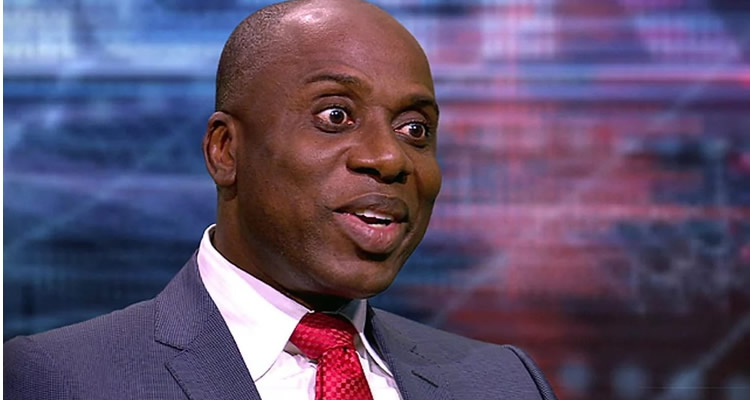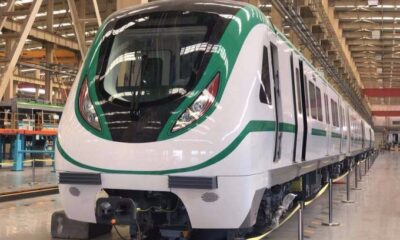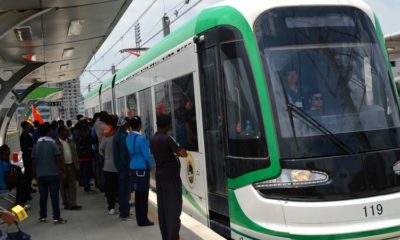- Railway: Amaechi Accuses Chinese Firm of Breaching Contract
Nigeria is to take delivery of 10 additional coaches that will be deployed on the Abuja-Kaduna and Lagos-Ibadan rail lines.
It was gathered that the coaches were meant to arrive in Nigeria from China by June this year and they are part of the 64 coaches being manufactured for Nigerian rail lines by the Chinese Railway Rolling stock Corporation.
The Minister of Transportation, Rotimi Amaechi, who disclosed this when he led a delegation to China to inspect the pace of work at the CRRC, also stated that the Chinese corporation had failed to meet the contract delivery date as agreed.
He was quoted in a statement issued on Monday by the Federal Ministry of Transportation as saying, “We need the coaches by June latest. We need coaches that can carry men from one point to another and we need a minimum of 10 coaches now out of the 64. I requested for 10 coaches now because we need to improve on the Kaduna-Abuja line.
“If the 10 (coaches) don’t come, there is nothing I can do but they have to come because they have to manufacture for us to use in Kaduna-Abuja and again Lagos-Ibadan, which will soon be ready. We also have to ensure that we get coaches that we can use pending when they finish the construction of the 64 coaches.”
Amaechi said the pace of work was slow and urged the manufacturers to improve on it, adding that the contract had expired.
He said, “The pace of construction is slow and they need to improve on it. In fact, the contract has expired; we may not have paid all the money but we paid quite a substantial sum and, therefore, they should construct speedily.
“The contract was signed in December 2017 and was supposed to expire in February 2019. The time has expired and there is a breach of contract but we will look at what the law says because more than one third of the money has been paid.”
The minister, however, pointed out that the issue was not with CRRC but a contract between Nigeria and the China Civil Engineering Construction Corporation, adding that the matter would be addressed in Nigeria.
The General Manager, CRRC, Zhou Junnian, explained that the passenger coach components were 100 per cent from China and materials for the works depended on the speed of the product and the customer’s requirements.
He noted that in future, CRRC would work with the CCECC to meet the high standard and quality needed to finish the projects.
Amaechi also visited the CRRC Shandong facility to inspect the cargo wagons being built for Nigeria, where he disclosed that there was a verbal agreement with the CCECC to localise the railway industry in Nigeria which was supposed to produce 15 per cent of the coaches, locomotives and wagons.
The minister said, “We had a verbal agreement for them to produce 15 per cent of the coaches, locomotives and wagons. They came back and said it was too expensive to establish locomotives and coaches factory and that we can start with the wagon and do 100 per cent assembly in Nigeria for the first five years. After the first five years, they will now build a factory that will manufacture wagons in Nigeria.
“It is not part of the contract we signed in 2017 but I insisted that for me to sign, they must localise it to create more jobs and reduce the expenditure of foreign exchange. Instead of going to buy dollars, you pay the Chinese in their local currency.
“We have to go further to ask them if we can own it. We have not talked about ownership but what we said was localise it. Although they are using their profit to build it, you can make them hand over the ownership to Nigeria. As for the assembly plant, I intended for Zaria but they chose Kajola in Ogun state.”
Amaechi further directed the Nigerian Railway Corporation to provide land for the wagon factory to CCECC before May 8, 2019.

 Naira3 weeks ago
Naira3 weeks ago
 News4 weeks ago
News4 weeks ago
 Naira4 weeks ago
Naira4 weeks ago
 Naira3 weeks ago
Naira3 weeks ago
 Jobs3 weeks ago
Jobs3 weeks ago
 Travel3 weeks ago
Travel3 weeks ago
 Naira3 weeks ago
Naira3 weeks ago
 Investment4 weeks ago
Investment4 weeks ago
























